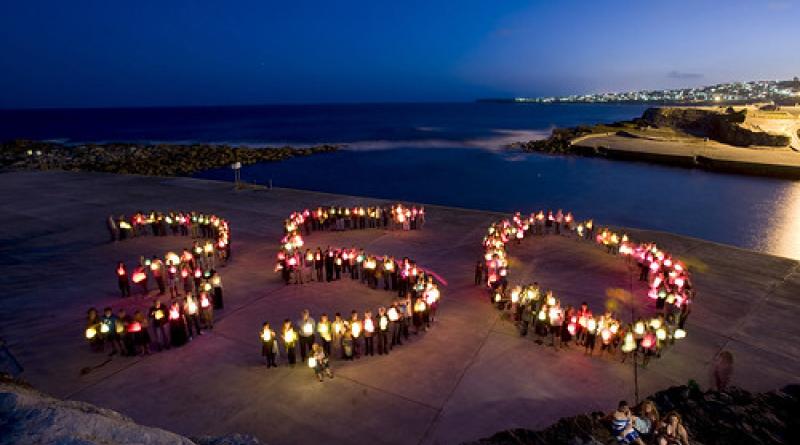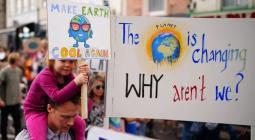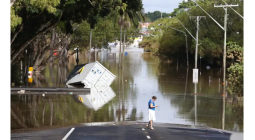350.org reacts to release today of UN IPCC Climate Report: “FOSSIL FUELS DID THIS”

Global -- 350.org takes actions and puts forward strong reactions to today's' release of the UN IPCC Climate report entitled; Climate Change 2022: Mitigation of Climate Change.
For 30 years the UN IPCC reports have proven beyond doubt that Climate impacts are increasingly frequent and devastating. Frontline communities, who have contributed the least to the climate crisis, are increasingly experiencing the worst impacts. We have a decreasing window of time to prevent the worst of all possible futures, but we are hopeful that by taking action we can create the change needed to solve the crisis.
In African nations most impacted by climate catastrophes, often leading to massive fires, drought and hunger, activists this week are taking action. In Ghana there will be a march by climate defenders to call on MPs demanding 30% renewable energy as prescribed by the Renewable Energy Act. In Uganda groups opposing the East African Crude Oil Pipeline (EACOP) will deliver the IPCC report to Standard Chartered and Standard (Stanbic) Bank Branches and hold actions in front of Total stations to highlight threats posed by the pipeline and the need to #StopEACOP.
Quote-list from global 350 spokespeople (interviews available):
350.org Executive Team:
May Boeve is the Executive Director of 350.org,
(USA Pacific Time zone, GMT -8)
“The IPCC report highlights the cause of climate problems; fossil fuels did this. Since the Ukraine war started, fossil fuel companies and their executives have been profiting off the skyrocketing energy prices, while many people can barely afford heating or gas. It’s time for a rapid pivot to clean energy.”
Namrata Chowdhary is the Head of Public Engagement at 350.org,
(GMT time zone)
“How much more destruction must we witness, and how many more scientific reports will it take, before governments finally acknowledge fossil fuels as the real culprits behind the human suffering being felt across the globe? As we come ever closer to the tipping points for human existence, once again scientists are sounding a clear alarm: massive cuts in emissions are unavoidable to avert the worst.”
Fenton Lutunatabua is Head of Regions at 350.org,
(Fiji time zone, GMT +12)
“The climate crisis touches all of us, but the IPCC report shows that fossil fuel consumption by the wealthiest is causing serious damage, and the people who must survive the worst impacts are also often on the frontlines of social and economic injustice. Yet the antidote to fear is hope: these same people are leading the way toward community-based solutions all over the world. Together, we’ll fight to cut off the money flowing to fossil fuels, and build the safe, just future we all deserve.”
Spokesperson Asia:
Chuck Baclagon is the Asia Regional Finance Campaigner at 350.org
“It is clear beyond doubt that fossil fuel consumption has put us in this dire situation and we must acknowledge that Asian banks are still the top lenders and underwriters for coal globally. The way out of this crisis is if we turn off the money tap to the fossil fuel industry and redirect it to community-led local solutions. The IPCC report points to mitigation measures that governments can take but it is crucial that we, the people, keep our financial institutions under the microscope, and demand an end to fossil fuel finance.”
Spokesperson Pacific:
Joseph Sikulu is the Pacific Regional Managing Director at 350.org
“We are in a critical stage and it is clear that current mitigation measures are not enough. What we in the Pacific know is that our very survival depends on drastically reducing carbon emissions – and the fastest way to bring us back on track for our goal of 1.5 degrees celsius is by keeping all fossil fuels in the ground. How do we end the reign of fossil fuels? Turn off their money tap. We are asking that global leaders and financial institutions stop financing fossil fuels, and start funding just, community-led solutions to this crisis.”
Spokespeople Africa:
Landry Ninteretse is Africa Regional Director at 350.org
“Fossil fuels continue to fuel the climate crisis, leading to widespread devastation in vulnerable regions such as Africa where extreme and frequent weather events are being regularly experienced. The IPCC has not only called for urgent action, but also outlined crucial interventions needed to meet mitigation and development goals. This means developed nations need to not only fulfill their promise of drastically reducing their emissions, and also commit finances towards adaptation, but also clean energy transition, technology transfer and mitigation in the Global South.
Glen Tyler-Davies is the South African team leader at 350.org
“As we continue to experience increasingly severe climate impacts, the IPCC has emphasized the speed at which we need to act, and highlighted solutions to scale up mitigation interventions. For South Africa, this is a call to put in place ambitious, national plans for a just transition away from coal, to socially owned renewable energy. Our public finance institutions must immediately stop funding fossil fuel projects, and facilitate the funding of a Green New Eskom. We must also hold the government to account to get us on track with this transition.
Footage and photos of the mobilizations across the world are available in a searchable database here:
https://350org.
Images are available free of charge to press.
Please credit 350.org
350.org is an international movement of ordinary people working to end the age of fossil fuels and build a world of community-led renewable energy for all.




